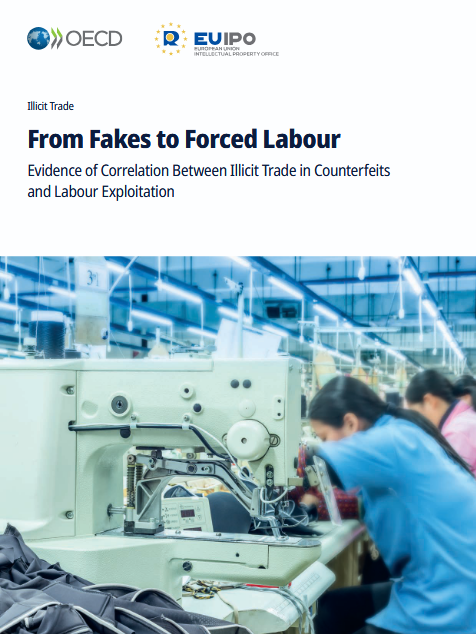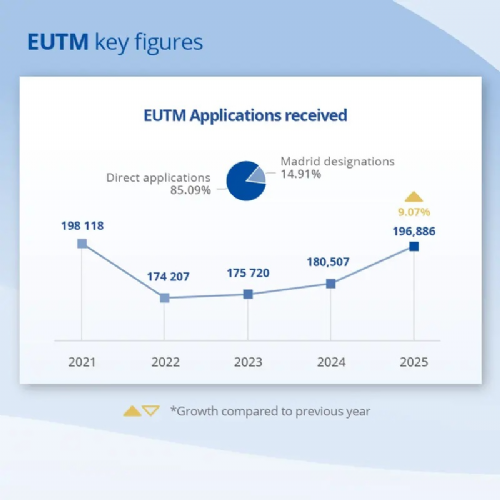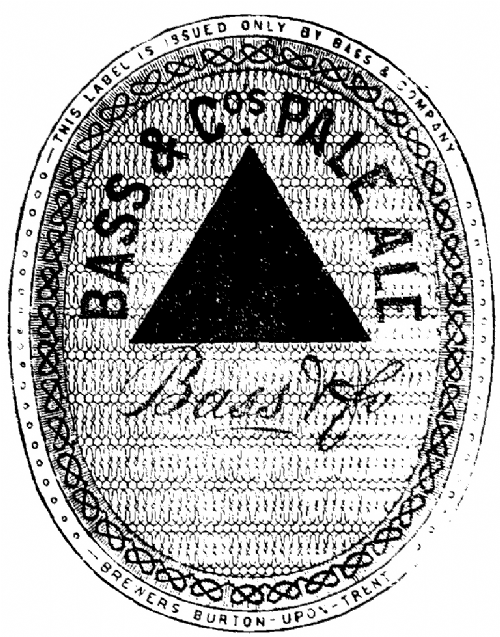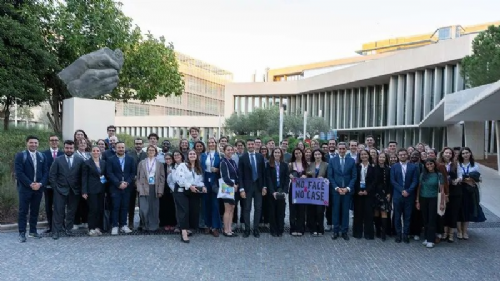Now in its twelfth year, Class 46 is dedicated to European trade mark law and practice. This weblog is written by a team of enthusiasts who want to spread the word and share their thoughts with others.
Click here subscribe for free.
Who we all are...
Report shows links between counterfeits and forced labour
 A new report by the EUIPO and OECD provides evidence of the correlation between illicit trade in counterfeits and labour exploitation.
A new report by the EUIPO and OECD provides evidence of the correlation between illicit trade in counterfeits and labour exploitation.
The report, “From Fakes to Forced Labour” was published on 20 January and is available on EUIPO’s website here (PDF). EUIPO also hosted a webinar on the topic, which can be viewed here.
The report is based on descriptive evidence, correlation analysis and econometric modelling. It found that: “Countries more frequently identified as sources of counterfeit goods tend to display higher levels of child labour – including hazardous forms – , greater prevalence of informal employment, longer working hours, weaker labour protections, and higher incidence of fatal occupational injuries. Positive correlations also emerge between the value of counterfeit exports and the prevalence of forced labour.”
Econometric modelling suggests that a one-percentage-point increase in the prevalence of forced labour is associated with an estimated 0.0076% increase in the value of counterfeit trade.
The report makes a number of policy directions, including:
- combining strengthened labour protections,
- enhanced trade-enforcement tools,
- improved data availability, and
- responsible business conduct.
It states: “Understanding and acting on the labour-abuse component of trade in counterfeits is crucial not only for worker protection and market integrity, but also for undermining the criminal groups that profit from it.”
The MARQUES Anti-Counterfeiting and Parallel Trade Team is studying the report and may provide further analysis soon.
The picture shows the cover of the report.
Posted by: Blog Administrator @ 09.31Tags: EUIPO, OECD, forced labour, counterfeits,


 Sharing on Social Media? Use the link below...
Sharing on Social Media? Use the link below...Perm-A-Link: https://www.marques.org/blogs/class46?XID=BHA5417
EUTM applications increase by 9%
 The EUIPO received 196,886 EUTM applications in 2025, an increase of 9.07% on 2024, according to figures published by the Office this week.
The EUIPO received 196,886 EUTM applications in 2025, an increase of 9.07% on 2024, according to figures published by the Office this week.
85.09% of the applications were direct applications, with Madrid designations making up 14.91%.
EU Member States accounted for 57.5% of applications. The top countries of origin of applications worldwide were:
| Country | Number |
|---|---|
| China | 31,265 |
| Germany | 24,988 |
| USA | 17,715 |
| Italy | 13,502 |
| Spain | 12,686 |
| France | 9,177 |
| UK | 8,411 |
| Poland | 7,826 |
| Netherlands | 7,179 |
Applications from China grew by 13.3%, while those from the EU increased by 9.4%. Among EU countries, there was significant growth in the Netherlands, Austria, Germany and Poland.
The top classes were:
| Class | Nnumber |
|---|---|
| 35 | 37,251 |
| 09 | 31,387 |
| 42 | 26,038 |
| 41 | 22,653 |
| 25 | 13,405 |
| 05 | 11,660 |
| 03 | 10,856 |
| 37 | 8,577 |
| 16 | 8,388 |
| 36 | 8,223 |
Read more on EUIPO’s website here, from where the above chart is taken.
Posted by: Blog Administrator @ 09.01Tags: EUTM, EUIPO, Madrid designations,


 Sharing on Social Media? Use the link below...
Sharing on Social Media? Use the link below...Perm-A-Link: https://www.marques.org/blogs/class46?XID=BHA5416
Vote for most iconic UK trade mark
 To mark the 150th anniversary of the UK trade mark registry on 1 January 2026, the UK IPO is asking users to vote for the most iconic registered mark.
To mark the 150th anniversary of the UK trade mark registry on 1 January 2026, the UK IPO is asking users to vote for the most iconic registered mark.
The first mark to be registered in the UK was filed by brewer Bass (UK00000000001, pictured) on 1 January 1876. Today, there are more than 2.5 million marks protected in the country.
You can vote for the most iconic trade mark on the UKIPO website here. Voting closes on 31 January 2026. The mark can be a registered logo, brand name, colour, sound or motion mark.
The UKIPO invites you to say what the chosen trade mark is special to you and what you think makes an iconic trade mark stand out from the rest.
Posted by: Blog Administrator @ 13.56Tags: UKIPO, Bass, iconic trade mark,


 Sharing on Social Media? Use the link below...
Sharing on Social Media? Use the link below...Perm-A-Link: https://www.marques.org/blogs/class46?XID=BHA5415
Grenada joins Madrid System
 WIPO has confirmed that the government of Grenada deposited its instrument of accession to the Madrid Protocol on 15 December 2025.
WIPO has confirmed that the government of Grenada deposited its instrument of accession to the Madrid Protocol on 15 December 2025.
The Madrid Protocol will enter into force in Grenada on 15 March 2026.
The country becomes the 116th member of the Madrid System and the 10th in Latin America and the Caribbean. The international trade mark system now covers 132 countries in total.
WIPO will announce further information about specific declarations regarding time limits and applicable fees soon.
Grenada is an island country in the Windward Islands, known as the “Island of Spice”. According to Wikipedia, it had an estimated population of 114,621 in 2024 and a per capita GDP (PPP) of $20,195 in 2023.
Its main industries include tourism and agriculture (particularly the production and export of nutmeg, rum and chocolate). Popular sports include athletics, cricket and football.
Read more on WIPO's website here.
Posted by: Blog Administrator @ 09.06Tags: Madrid System, WIPO, Grenada,


 Sharing on Social Media? Use the link below...
Sharing on Social Media? Use the link below...Perm-A-Link: https://www.marques.org/blogs/class46?XID=BHA5414
Seasonís Greetings
 MARQUES wishes all our members, their colleagues and families, as well as all readers of the Class 46 blog, a Merry Christmas and Happy New Year!
MARQUES wishes all our members, their colleagues and families, as well as all readers of the Class 46 blog, a Merry Christmas and Happy New Year!
During the festive period, you can continue to engage with MARQUES on social media and view the resources on the website.
Please note however that the MARQUES Secretariat will close after business hours on 23rd December and reopen on Monday 5th January.
Any communications received during the festive period will be actioned after 5th January.
MARQUES has big plans for 2026, including the 40th Annual Conference, in Lisbon in September, and the first Design Symposium, in Frankfurt in January. View the events page to find out more.
We look forward to seeing members at these and other events during the year.
Picture created by MARQUES
Posted by: Blog Administrator @ 11.45Tags: Christmas, New Year, Lisbon, ,


 Sharing on Social Media? Use the link below...
Sharing on Social Media? Use the link below...Perm-A-Link: https://www.marques.org/blogs/class46?XID=BHA5413
Copyright, AI and the EUís next steps
 Pigi Konstantinou of the MARQUES Copyright Team shares some takeaways from EUIPO’s first copyright conference.
Pigi Konstantinou of the MARQUES Copyright Team shares some takeaways from EUIPO’s first copyright conference.
The EUIPO held its first-ever copyright conference at its headquarters in Alicante on 20–21 November 2025, marking a clear strategic shift of the Office toward deeper engagement with copyright matters.
The event celebrated the launch of the new EUIPO Copyright Knowledge Center, which provided the framework for two days of rich discussions, insightful presentations and various cultural activities.
The audience reflected the diversity of the copyright ecosystem: policy makers, major tech companies, academics, performers’ and authors’ representatives, as well as copyright experts and IP practitioners.
In parallel with the main sessions, the EUIPO hosted live concerts, dance performances, local creators showcasing handmade works, the unveiling of a mural, DJ sets, and a renowned visual artist drawing live throughout the conference.
Key takeaways from the presentations
A central theme was the EUIPO’s expanding role in the copyright field. The Office presented its ongoing initiatives, such as the Out-of-Commerce Works Portal, the Orphan Works Database, and AGORATEKA, and explained the mission of the Knowledge Center: to provide an authoritative hub for copyright-related news, case law, studies, and training materials and to support policy dialogue.
A forthcoming Copyright View service aims to enhance access to information on copyright status, authorship and rights ownership across Europe.
CJEU perspective
Maciej Szpunar, First Advocate General at the CJEU, stressed the crucial role of the Court in interpreting core legal notions amid fast-moving technological developments. He identified key structural challenges the internet and digital technologies pose to copyright law:
- Erosion of territoriality
- Transformation of storage, transmission and access to information
- Uncertainty surrounding exhaustion in the digital environment
- Reconfiguration of liability rules, with secondary liability becoming more central than primary infringement
- Increasing tension among fundamental rights and the need to balance them
He also referred to two of his recent opinions: HP Netherlands (C-496/24) on the private copy exception and Meta Platforms Ireland (Case C-797/23) on the press publishers’ right.
Ensuring cultural diversity in the age of AI
Professor Martin Senftleben focused on safeguarding both fair remuneration for authors and the cultural diversity of AI systems, an urgent priority, in his view. His proposals favoured regulating AI outputs rather than restricting inputs and emphasised collective licensing schemes as a more viable solution than individual licensing.
He outlined a model in which AI systems freely mine works, combined with levies at market entry and collective management of remuneration, with an opt-out pathway for rights holders seeking individual licensing.
Regulatory horizons: towards a General Copyright Regulation?
MEP Axel Voss underscored the persistent need for updated legislation. He floated the possibility of a General Copyright Regulation, analogous to the GDPR, to overcome fragmentation arising from national divergences.
Article 4 of the DSM Directive, he clarified, was never designed to address generative AI. In his view, the solution lies in licensing mechanisms and transparency obligations grounded in international law.
Mr Voss also advocated for the creation of an EUIPO-managed opt-out register, providing standardised, machine-readable notices for AI developers and potentially operating as a one-stop-shop licensing interface.
Creators’ concerns
Artists’ and authors’ representatives repeatedly stressed the importance of awareness, noting unequal national protection standards and the rapid evolution of AI tools. While many expressed concerns, some acknowledged new creative opportunities offered by AI.
Interestingly, the much-debated idea of an EUIPO copyright registration system remained largely peripheral. Nonetheless, collecting societies such as GEMA voiced significant reservations regarding its feasibility and effect on existing rights management structures.
Conclusion
The conference marked an important first step in the EUIPO’s growing involvement in copyright policy. How this initiative will unfold, especially in the complex landscape of generative AI, remains to be seen.
What is clear is that the conversation has begun, and the Office now stands at the threshold of shaping a more coherent and future-proof European copyright framework.
Pigi Konstantinou is a partner at Souriadakis Tsibris, Greece and a member of the MARQUES Copyright Team
Read more about the Copyright Conference, and view recordings of the sessions, on EUIPO’s website here, from where the picture above is taken
Posted by: Blog Administrator @ 09.01Tags: EUIPO, copyright, AI,


 Sharing on Social Media? Use the link below...
Sharing on Social Media? Use the link below...Perm-A-Link: https://www.marques.org/blogs/class46?XID=BHA5412
Thirteenth edition of Nice Classification
 WIPO has announced that the 13th edition of the Nice Classification will take effect on 1 January 2026.
WIPO has announced that the 13th edition of the Nice Classification will take effect on 1 January 2026.
New editions of the Nice Classification are published every three years, with annual updates to each edition.
In the new edition, certain goods and services have been reclassified. You can review the changes on WIPO’s website here.
The new edition will apply to all new applications received by offices of origin from 1 January 2026 and any application that WIPO receives from 1 January 2026 after the two-month time limit referred to in Article 3(4) of the Madrid Protocol.
Existing trade mark applications do not need to be reclassified.
The goods and services manager in eMadrid will be updated on 1 January 2026.
For more information, read the announcement on WIPO’s website here.
Posted by: Blog Administrator @ 08.52Tags: Nice, Madrid, WIPO,


 Sharing on Social Media? Use the link below...
Sharing on Social Media? Use the link below...Perm-A-Link: https://www.marques.org/blogs/class46?XID=BHA5411

